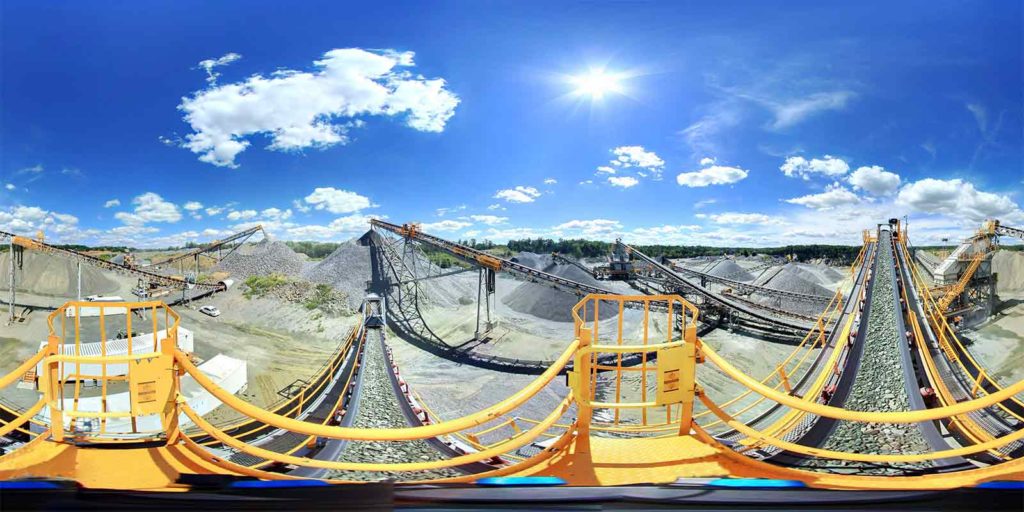Stone crushers are an essential piece of machinery that helps to make the construction process more manageable and efficient. While stone crushing machines are a required tool on the job site, they do pose some environmental concerns that construction managers should be aware of.
Stone crushing machines can be a serious environmental hazard to cities and towns. The dust and noise created can be extremely disruptive, and the emissions from the engines can be harmful to people and animals. In addition, the use of stone crushers can contribute to the erosion of soil and the pollution of waterways.
Cities and towns that are considering using stone-crushing machines need to weigh the benefits against the potential environmental impacts. They should also take steps to mitigate any negative effects, such as purchasing more environmentally friendly machinery, installing filters on the machines to reduce dust emissions, or locating them in areas that will not have a negative impact on residents or local ecosystems.
What Are Stone-Crushing Machines?
Stone-crushing machines are essential for various construction and demolition projects. These big pieces of machinery help break large pieces of rock and concrete into more manageable sizes. This helps to speed the process of construction and demolition, while also preventing injuries caused by handling large chunks of stone. Additionally, stone-crushing machines can be used to recycle old concrete and asphalt into new building materials. This helps reduce the amount of waste produced by construction and demolition projects, and it also helps to conserve natural resources.
Overall, stone-crushing machines help construction teams handle large stones more efficiently to create materials that can be used in construction projects of any scale.
Environmental Risks of Stone Crushers
Some stone-crushing machines use a lot of energy, which can be harmful to the environment. By using energy-efficient equipment, the carbon footprint is reduced and the amount of pollution created is minimized. Moreover, these machines are often designed with safety in mind, which lessens the chance of accidents.
While stone crushers are essential in the modern construction industry, there are environmental concerns that construction teams should be aware of when planning to purchase new equipment or deploy a stone crusher to a job site:
-
Air pollution
Stone crushing machines can potentially cause air pollution from emissions and dust. If not properly operated, they can release large amounts of dust into the air, which can contaminate the environment and cause health problems for people living near them. Stone crushers also have the potential to release harmful emissions that include carbon monoxide, sulfur dioxide, nitrogen oxides, and particulate matter. These pollutants can cause respiratory problems, heart disease, and other health issues if they are not controlled.
-
Water pollution
Potentially, stone crushers can cause water pollution due to the large amounts of dust and other pollutants they release into the air. This can contaminate nearby waterways and make them unsafe for swimming, drinking, and fishing. The large amounts of dust that are often released can also contaminate water supplies and make them unsafe for use.
-
Power
Stone crushers are often gigantic pieces of machinery capable of enormous feats of power. In order to create this much force, however, a large amount of power is needed. This large power demand can lead to pollution and greenhouse gas emissions.
Mitigating Environmental Impact
Certain stone-crushing machines can have a massive environmental impact when used improperly. There are a number of ways to improve the environmental impact of the stone crushers you utilize in your operations:
-
Utilizing environmentally friendly machinery
One way is to use more environmentally friendly machines, which produce less noise and dust, and are also easier to maintain. There are a few different types of stone-crushing machines that don’t harm the environment. The first type is a jaw crusher, which uses metal plates to crush rocks. They don’t produce any harmful emissions and are very efficient.
There are also specially designed crushers made to conserve energy and improve their environmental footprint. Models such as the HP5 cone crusher from Mellott are designed to be more efficient by utilizing automatic settings, specialized maintenance tools, reduced emissions, and energy-efficient motors.
-
Proper usage
Another way to lessen the environmental impact of stone crushers is to use better management practices. This includes properly maintaining and using the crushers correctly. It also entails proper disposal of waste products. When machinery is properly maintained and used according to manufacturer guidance, they are less likely to discharge harmful emissions.
Reducing Environmental Impact With Mellott
When it comes to crushing stones, it’s important to use equipment that is environmentally friendly. Not only does it conserve valuable resources, but it also helps to protect the environment.
Choosing the right stone-crushing machine is an important decision, and it’s one that should be made with the environment in mind. By using equipment that is both energy efficient and safe, we are working to do our part to protect our planet. Reach out to our team of experts at Mellott by calling us at 855-554-1606 to learn more about utilizing modern, energy-efficient stone crushing machines.

